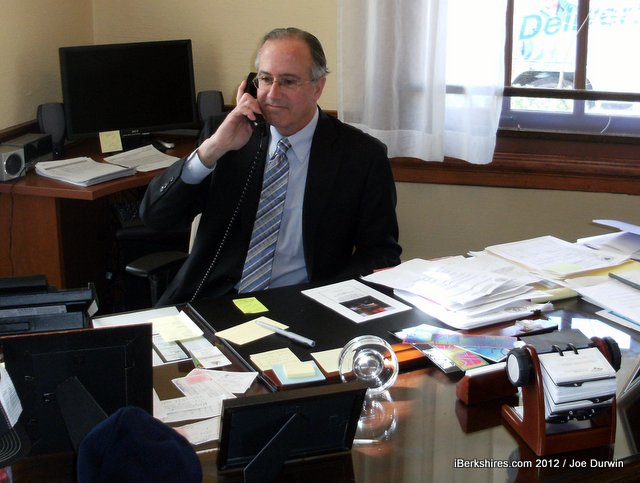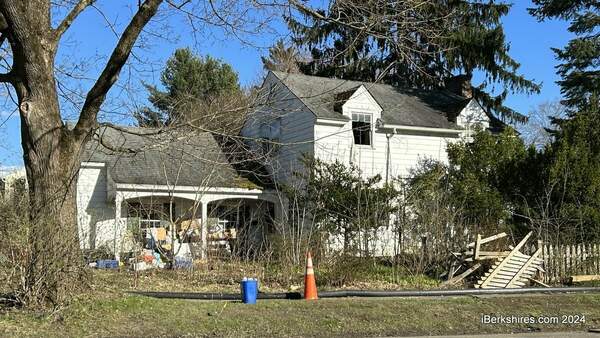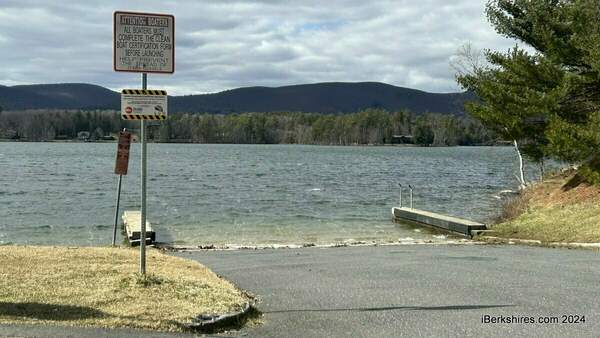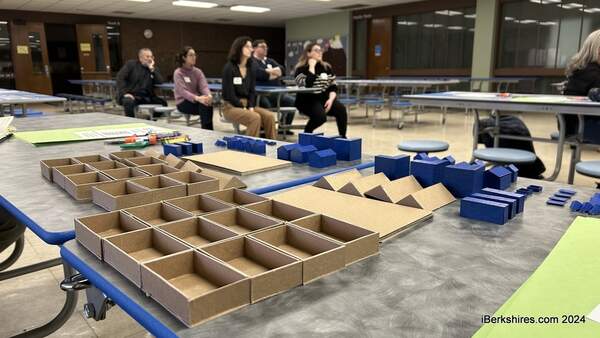From the Corner Office: Conversation with Mayor Bianchi
|

iBerkshires sat down with the mayor on Monday, the day before the start of the new fiscal year, for a chat about the issue.
|
Another installment in a semi-regular series of ongoing discussions with Pittsfield's mayor on the pertinent issues of the day.
Question: This is the start of the new fiscal year. How does the fiscal 14 budget that you are closing out look?
Mayor Bianchi: We are closing it out right now. It looks like it is a very tight budget. There are a number of departments that were really challenged this year. Public works in particular because of the winter we had, we're very challenged to balance that budget. We are working on that right now.
Public safety, another one, with all of the special events - wonderful events we've engaged in over the course of the year - they require overtime with our Police Department.
We've had walking beats that have required coverage and as a result of that we are challenged with keeping the public safety budgets balanced.
Every year we try to cut as much as we can and as a result, closing the books is a challenge. We are moving money around to make sure we're balanced. I've been signing transfer orders to move one account to another and we'll find out where we end up. We've got until the 15th of July to finalize that.
We will have realized a very tight fiscal year 14 budget.
Question: Last year's capital budget: Can you give me a rundown on where we are on the various projects?
Hibbard School, we've made a number of improvements over there and roadwork. Last year was really a lot of roadwork. Our biggest project was Hancock Road and that cost us in the neighborhood of $1 million between the road and the associated sewer and water. That was a very big part of the capital budget.
We also had equipment purchases, a variety of trucks and equipment. We purchased some cruisers last year.
I know there is some work associated with Hancock Road that needs to be finished up this year. That was a very complex project and one that exemplified the need to stay on top of things. If you don't, and you let things go, it just takes forever to get them done.
I think one of the more visible and emotionally charged investment we made was the new athletic floor at Pittsfield High School. It was certainly something that needed to be replaced. Unfortunately, we didn't have a basketball floor that functioned properly. A new wooden floor boosted the morale of the entire school. I was sorry that the lady Generals volleyball team had their season disturbed but in the long run, the entire school really appreciated.
Question: We'll move on to FY15. Can you talk about the budget you've characterized as a "maintenance budget?"
The operational budget this year is once again one I would characterize as being relatively tight. One of the increases was the debt services. In other words, we've been out committing ourselves to a lot of roadwork and we've done it with short-term debt. We've converted that to long-term debt and the principal and interest on it will cause our entire debt service to go up about $1 million. But, it is a good investment.
I'm very pleased that our debt service issuance was well received by the investment community with an interest rate on the long-term debt at .75 percent, less than 1 percent. That just speaks to the overall strength of our financials.
Question: How did the long-term debt affect the crafting of the budget?
It was a combination of long-term debt, the school department budget was up by $1 million and that was contractual obligations for the most part, our health insurance was up by a half of a million dollars and our pension obligation was up considerably.
There are certain things we know are going to go up. And as long as we have a capital budget that debt service will increase. Unfortunately, you can't go for decades without making investments and we will be making more in the future.
Question: What about the capital plan, which has not been passed yet. What are some of the highlights?
I thought it was a compromise with the City Council; apparently they didn't think we compromised enough. But, it was going to allow us to continue with our roadwork that we've committed to.
It was, originally, going to allow us to continue to look at a highway garage.
We have stormwater improvements that have to be considered. There are improvements in the Elm Street area that are needed. There are hazard beacons at the airport that should be addressed. We have a variety of very small projects but important ones. We have asbestos in our buildings and we have consistently been abating those. Our heating system in a lot of our schools - Pittsfield High School, Taconic and Crosby - need to be addressed.
Security and safety is just a high, high priority. We need to make sure our locking systems and cameras up to date. We have a very good security program and protocol in schools but we want to continue to improve on that.
Our two community schools - Morningside and Conte - they need to have the carpeting and floor replacement. When carpeting gets old, it holds onto a lot of things that should be removed. We want to continue to do that.
We have invested in a garage and we have invested in a management program. We've had consultants come in and now we'd like to move forward on those recommendation. That was embedded in this year's capital budget proposal. The Springside House and Springside Park are very important to this community and are in need of repair. That is in there.
The city has to be prepared for the next phase of streetscape. We want to get North Street completed and you don't do that unless you are prepared with the design work. When the state or federal government comes and asks you for your next transportation project, you want to have a plan. And that plan is in the capital budget.
The artificial turf field at Berkshire Community College is part of the budget. And then there are a number of small things. For public safety, it may not sound like much but $18,000 for vest replacements for our police officers or radios for our police officers are important things.
We have bleachers at Pittsfield High School we want to replace. The stage that we use for any number of municipal events and we rent out needs work. There are just dozens of things that need to be repaired.
Question: You mentioned the new highway garage isn't in the capital plan and you were also looking at a police station, which also wasn't in the plan...
A police station we would have loved to put in the capital budget but that could be a $15 to $20 million item.
One of the things I asked the consultants to do - Kaestle Boos - is to identify federal sources of money for the construction. How would we go about collaborating with federal agencies that might want to have a presence here in the city of Pittsfield? Could we eliminate a fire station and put a fire station in with the new police station? Would that be a possibility so we could access federal dollars that have traditionally funded fire stations? Does that enhance our application? That is the next step.
Probably the easier step is to identify parcels of land where a police station might go and what it would look like. The harder part is how do we pay for it. At some point in time we will be required to make a capital contribution and we will. But we can't do it all on our own, just like the new school.
The new career, vocational school is going to be a cornerstone of economic development in the city of Pittsfield and I believe in Berkshire County. We can't do it alone and we know the state will stand behind us and pick up between 75 and 80 percent of that investment. We have to take advantage of the state's willingness to invest in the educational facilities and we need to keep moving that along.
If not next year, the year after will we will have to include in the capital budget our share of the career, vocational, technical high school. When we do that, then we will be poised to improve the probability of economic expansion because we will then have a new high school with excellent career, technical, vocational programming.
I anticipate that we'd be working much more closely with Berkshire Community College so a lot of these youngsters engages in the programs will be able to improve their training at Berkshire Community College. I would like to see them do it before they even graduate high school. I'd like to see our career, vocational, technical kids and other college prep students going out the Berkshire Community College and taking some of their courses out there.
Maybe having professors from BCC coming down to the new high school so that these kids by the time they receive their diploma will have had to opportunity to accumulate college credits. That will help their parents out. It will give those kids with the training a better opportunity to gain a job here in the city of Pittsfield.
At the same time, I am very hopeful that our innovation center will move forward. I am confident that it will at the William Stanley Business Park. That is going to be another cornerstone to economic development. Now you are going to have a facility for those companies that are poised to grow or can have success with new technology for them to collaborate with other organizations - such as the nanotech facility in the SUNY Albany area. They've already said they want to be part of this new innovation center.
They'll be able to collaborate with the University of Massachusetts at Amherst and Lowell, both of whom have strong departments in polymer sciences. The strong applied materials companies in this area that could grow will only be able to do so by accessing the cutting edge technology and the organizations involved in them.
If we can help companies grow with this innovation center and we can help youngsters grow and get the 21st Century education and training they need to be employed by those companies, we then are creating a real strong dynamic.
With the science center that was built at MCLA, I've already talked to companies here in Pittsfield that said they are doing such advanced things. Even though we are in the applied materials and plastics business, we need people who have had training in physics and chemistry. That science center will provide that.
Wouldn't it be neat to take a kid whose in the career, vocational, technical program at Taconic and move him or her on the Berkshire Community College with college credits before they even graduate. And then, for some of those kids move them onto MCLA and give them the training they need for the higher level, technical and scientific background that they'll need to be employed in the cutting edge applied materials businesses right here in the city of Pittsfield and throughout Berkshire County. Then you will see a vibrant economic development plan occurring here.
The economic development piece and the educational piece are incredibly linked, especially when it comes to life sciences and applied materials. My goal is to have an economic development occurrence that will give great opportunity to youngsters so we won't have to hop on a plane to go see our grandchildren. Hopefully, we are giving opportunities to many of them. I see that laying out very clearly.
Question: At the end of 2013, I asked you about your priorities. Taconic and the Science Center were the top. In the last seven months, what has your office done to forward both of those projects?
Well, first of all we've strongly influenced the PEDA board. By sitting on the PEDA board, making changes to the PEDA board and by directing our emphasis away from retail at the PEDA site and focusing it squarely on manufacturing and squarely on 21st Century innovation, we were able to encourage the Life Science Center, which is the organization that is empowered to invest $1 billion into live sciences, to give us a grant to put together a well-developed study and proposal that identified the strengths of the area and a direction.
I had been heading kind of in the wrong direction by wanting to build a facility that might be able to draw people from the high tech and biotech arenas in the Boston area. But this really draws on the strengths of our area and our plastics and applied materials companies that are very successful and cutting edge but just need that help to move forward.
I think one of the big things in the last year was the change in my thinking and the change in the PEDA board to really play to our strength. That's what made us successful in getting the $9.7 million from Life Sciences. That was a big key.
Another thing over the last year, the new Taconic project seemed to have been dormant for years. I really worked closely with Treasurer [Steven] Grossman in Boston and he made his staff available to us to really get this project going again. I think it will be a key to economic development.
I think in the last 12 months, that's probably if I could point to a couple things, it is really getting those back on track when they were sidetracked.
Question: What is your next target?
The next target is a couple of things. Continuing he streetscape program, that's a give. We are going to continue that and as we finish up North Street, and I think we will in the next year or two, then we are going to turn the corner and get into the Elm Street area and the Morningside area. But we also want to create connectivity to the west side as well. That will be part of our streetscape in the future.
Without a doubt, we've put a lot of effort into the rail car manufacturing proposal to manufacture MBTA rail cars. I worked very closely with our federal delegation and people in Boston and I think we have put together a proposal that makes a lot of sense. I was able to convince the City Council of the wisdom of investing $1 million from the GE Economic Development Fund and PEDA saw the wisdom of investing $1 million in their funds. That was a lot of hard work to get to where we are able to have a proposal to be considered by various rail car manufacturers.
I've talked to Sec. [Richard] Davey; I've talked to a number of people who have suggested the city of Pittsfield has really captured the attention of the MBTA and the rail car manufacturers.
We've done what we can until this point. Now we have to position ourselves and gear ourselves to be ready for the next step. That is when the discussions begin as far as the rail car manufacturer selection process begins. But, I think we are in great shape. I have every confidence that we have gained the attention of the leading manufacturers and we've had a good story to tell.
Question: Let's touch on some of the broad topics. We'll start with public safety...
Right now our violent crimes, our aggravated assault, are way down. We're happy about that. Unfortunately, our property crimes are up and I am concerned about that - as is the chief. We've got to do more to address that.
Violent crime is way down in the last three to five years. It is down 35 percent, the bulk of that being aggravated assault. And it is down 82 percent over the five year average. While property crime, on average, jumped up 18 percent so that's concerning. Burglary and larceny up 2 percent and 18 percent. While larceny from a person is down by 38 percent.
We've had a number of break ins and if I could be so bold to suggest that I honestly believe it is a small number of people doing it. According to the chief, a lot of these break ins have similarities. Even though it is frustrating, once you catch one or two of these people, you'll see the numbers go back down.
Question: The Rest of the River clean has come out and the city is part of that. Can you talk about concerns you have with that?
My concerns are for the impact any cleanup will have on the residents in the neighborhoods that are going to be affected. That is the old Polo grounds neighborhoods and the East New Lenox Road neighborhood. I am concerned that their tranquility, for lack of a better word, will be distributed for a number of years. There are a lot of older people who live in those neighborhoods and I would hate to think they are going to be looking at the next decade of disruption.
We'll work as close as we can with DEP, EPA and with G.E. to make any impact as manageable as possible and minimize the disruption. Everybody wants to see a clean river but the cost has to manageable. And I'm not talking about the monetary things but the cost in disruption of lives. That's a very concerning thing.
Also the economic impact. We received grant funding through Berkshire Regional Planning and there was an estimate that the economic impact on communities from Pittsfield south could be as much as $275 million to a half of billion dollars. That's significant. We want to make sure those economic impacts are recognized. We want to minimize those impacts but they are real and it is up to the communities to push that point.
















